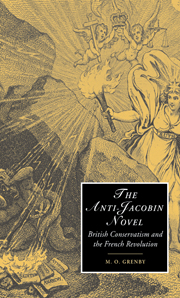Book contents
- Frontmatter
- Contents
- Preface
- Acknowledgements
- Introduction
- 1 Novels reproved and reprieved
- 2 Representing revolution
- 3 The new philosophy
- 4 The vaurien and the hierarchy of Jacobinism
- 5 Levellers, nabobs and the manners of the great: the novel's defence of hierarchy
- 6 The creation of orthodoxy: constructing the anti-Jacobin novel
- 7 Conclusion
- Notes
- Select bibliography
- Index
5 - Levellers, nabobs and the manners of the great: the novel's defence of hierarchy
Published online by Cambridge University Press: 22 September 2009
- Frontmatter
- Contents
- Preface
- Acknowledgements
- Introduction
- 1 Novels reproved and reprieved
- 2 Representing revolution
- 3 The new philosophy
- 4 The vaurien and the hierarchy of Jacobinism
- 5 Levellers, nabobs and the manners of the great: the novel's defence of hierarchy
- 6 The creation of orthodoxy: constructing the anti-Jacobin novel
- 7 Conclusion
- Notes
- Select bibliography
- Index
Summary
‘It is so,’ said Edward, ‘the happiness, nay the very existence of society, depends upon the due subordination of its members, and the contentment with that station assigned to us by Providence.’
Men who are born to fortune are appointed by Providence to the administration of a certain portion of the interests of the world: they are the helmsmen of happiness; and if they desert the wheel, is there any wonder that the even course should be lost?
Robert Dallas, Percival, or Nature Vindicated. A Novel (1801)One of the principal reasons for the attack on the novel in the late eighteenth century was that it was said to encourage equality. It is a proposition with which numerous twentieth-century scholars have agreed, contending that the eighteenth-century novel was somehow an intrinsically ‘bourgeois’, or at least ‘democratic’, form, insisting that it stressed the equality of man because every character possessed an equal capacity to feel, to fall prey to adventures, to become a protagonist. Contemporary critics of the novel, though, were worried less about the sudden elevation of a protagonist out of his or her social station, and more about the effect these texts were having on their readers, men and women who were, they feared, increasingly being recruited from the lower reaches of society. Such new readers were having aspirations implanted in their giddy heads, wholly out of keeping with their real stations in life.
- Type
- Chapter
- Information
- The Anti-Jacobin NovelBritish Conservatism and the French Revolution, pp. 126 - 168Publisher: Cambridge University PressPrint publication year: 2001



